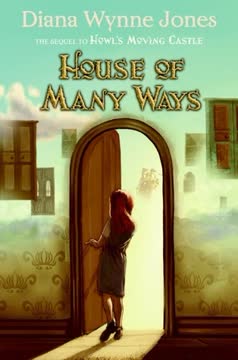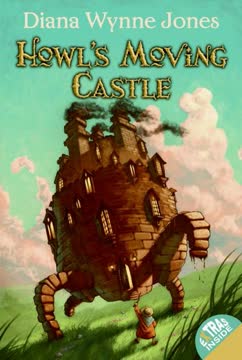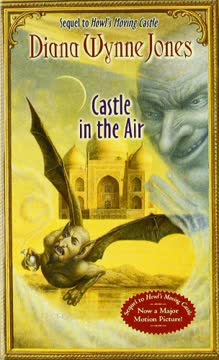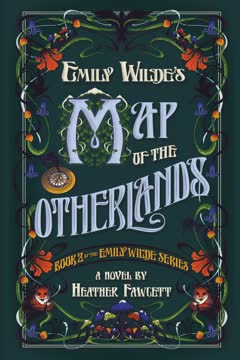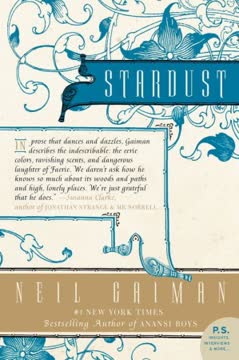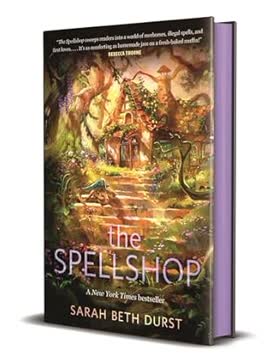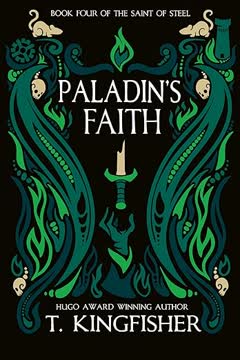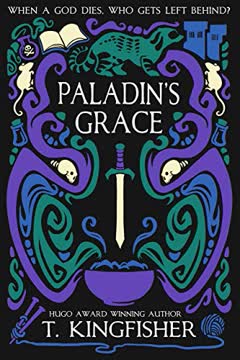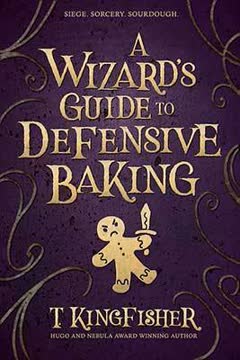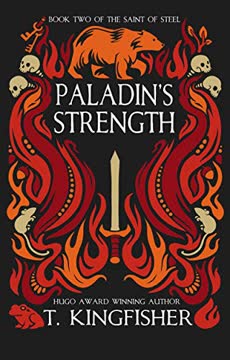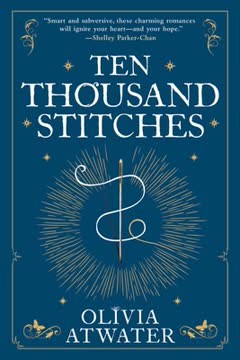Plot Summary
Reluctant Caretaker Chosen
Charmain Baker, a shy, book-loving girl, is unexpectedly chosen by her formidable Aunt Sempronia to care for her great-uncle William's house while he is away being healed by elves. Her parents, especially her mother, are anxious and controlling, but Charmain secretly yearns for adventure and independence. She sees this as her chance to escape her stifling home and perhaps, just maybe, get closer to her dream of working in the royal library. Despite her lack of practical skills and magical knowledge, she bravely accepts the challenge, setting the stage for a journey that will test her resourcefulness and courage.
Bewildering House, Bewildered Girl
Upon arrival, Charmain discovers that Great-Uncle William's house is no ordinary home. It is a labyrinth of magical doors, shifting rooms, and enchanted objects, all governed by rules she doesn't understand. The kitchen is a disaster, laundry piles up, and the plumbing is a mystery. She meets Waif, a timid, magical little dog, and receives cryptic instructions from her absent uncle's disembodied voice. Overwhelmed but determined, Charmain tries to make sense of her new responsibilities, quickly realizing that her sheltered upbringing has left her woefully unprepared for the magical chaos she must now manage.
Magic Mishaps and Mayhem
Curiosity gets the better of Charmain, and she experiments with her uncle's spellbooks, particularly The Boke of Palimpsest. Her attempts at magic are clumsy and unpredictable, resulting in a series of comic disasters: a failed flying spell, a kitchen full of bubbles, and a bathroom plumbing catastrophe. Each mishap reveals both the house's unpredictable magic and Charmain's own latent magical potential. Despite setbacks, she begins to learn through trial and error, slowly gaining confidence and a sense of agency, even as the house's mysteries deepen.
Unexpected Guests Arrive
Charmain's solitude is interrupted by the arrival of Peter, an apprentice sent by his witch mother, and a tribe of blue-skinned kobolds, magical creatures with their own grievances. Peter is as inexperienced and stubborn as Charmain, leading to bickering and further magical mishaps, including accidentally enlarging Waif and flooding the house. The kobolds, upset over the color of the hydrangeas in the garden, withdraw their help, making household tasks even harder. The dynamic between Charmain and Peter is fraught but slowly evolves into reluctant teamwork as they face the house's challenges together.
The Lubbock's Threat
While exploring the magical house and its many doors, Charmain stumbles into a mountain meadow and encounters a terrifying creature: the lubbock, a legendary, insectile monster that claims dominion over the land and threatens to "claim" her. She narrowly escapes thanks to a botched flying spell, but the encounter leaves her shaken. The lubbock's presence looms as a sinister threat, and its connection to the kingdom's troubles becomes increasingly apparent. The danger is not just magical mishap, but real evil lurking at the kingdom's edges.
Peter's Chaotic Entrance
Peter's arrival brings new chaos. He is eager to prove himself but lacks practical sense, leading to magical disasters—scalding water, a giant Waif, and a kitchen full of bubbles. His attempts to help often make things worse, but he and Charmain are forced to cooperate. Together, they begin to unravel the house's secrets, including its connection to other places and times, and the existence of unexplored rooms and magical maps. Their uneasy alliance is tested by the house's demands and the growing threat outside.
Royal Library Dreams
Charmain's secret letter to the King, requesting a position in the royal library, is answered. She is invited to assist the King and Princess Hilda in cataloging the royal collection. Overawed but determined, she navigates the intimidating world of royalty, befriends the kindly King, and discovers that the royal family is searching for lost treasure and a mysterious magical artifact called the Elfgift. Her work in the library becomes a key to unraveling the kingdom's mysteries, and she finds herself at the heart of a much larger story.
Kobold Uprising and Blue Flowers
The kobolds, led by Timminz and the troublemaking Rollo, escalate their protest over the hydrangeas' non-blue flowers, blaming Great-Uncle William's magic. Their withdrawal of help makes household chores nearly impossible, and their antics add to the magical mayhem. Meanwhile, Peter and Charmain struggle with laundry, dishes, and spells gone wrong, learning the hard way about responsibility and cooperation. The kobolds' actions are later revealed to be influenced by darker forces, hinting at the lubbock's manipulation.
The King's Secret Troubles
In the royal library, Charmain uncovers evidence of the kingdom's financial woes: missing gold, fake golden roof tiles, and a history of sold treasures. The King and Princess Hilda are searching for the lost Elfgift, a magical protector of the realm, and the missing royal gold. The arrival of foreign guests—Sophie, Howl, their son Morgan, and the fire demon Calcifer—adds new layers of intrigue. The royal family's problems are not just financial but magical, with threats both internal and external.
Magical House, Magical Problems
Great-Uncle William's house is revealed to be a magical labyrinth, with doors leading to other times and places, including the royal mansion and kobold caves. Peter and Charmain's explorations uncover hidden dangers, including the presence of lubbock eggs inside Great-Uncle William, planted during a past encounter. The elves, called in to heal him, remove the eggs but cannot destroy them. The house's magic is both a blessing and a curse, offering solutions and creating new problems.
The Lubbock's Eggs
The elves deliver the indestructible lubbock eggs to Charmain and Peter, warning that only a fire demon can destroy them. The eggs are a ticking time bomb, threatening to unleash new monsters. Peter's misguided attempt to "protect" the eggs with a spell only makes them more dangerous. Charmain races to the royal mansion to fetch Calcifer, who alone has the power to destroy the eggs. The urgency of the quest brings the story's magical and personal stakes to a head.
Allies and Enemies Revealed
As the royal guests and local characters converge, true allegiances and identities are revealed. Prince Ludovic, the King's heir, is exposed as a lubbockin—a human-lubbock hybrid—along with his sinister advisor. The kobolds' troubles are traced to Rollo's betrayal, having been bribed by the lubbock. The kingdom's problems are not just magical but political, with enemies within and without. Charmain, Peter, and their allies must act quickly to prevent disaster.
The Castle's Fiery Battle
Calcifer, the fire demon, confronts the lubbock in a dramatic magical battle. He uses the moving castle to chase and incinerate the monster, then destroys the lubbock eggs in a cataclysmic explosion that reshapes the landscape. The threat of the lubbock is finally ended, but at great cost—Calcifer is nearly destroyed, and the magical house is left shaken. The victory is hard-won, and the kingdom is left to pick up the pieces.
The Truth About Gold
With the lubbock defeated, attention turns to the kingdom's missing gold. Through magical investigation and the help of Howl and Sophie, the true location of the treasure is discovered: hidden under the royal mansion's golden roof, thanks to the wizard Melicot's cunning. The revelation solves the kingdom's financial crisis and exposes the full extent of the lubbockin's theft and manipulation. The restoration of the gold brings hope and stability back to High Norland.
The Elfgift Unveiled
The final mystery is solved when Waif, the unassuming little dog, is revealed to be the Elfgift—the magical protector of the royal family and the kingdom. Her loyalty to Charmain makes Charmain the new Guardian of the Elfgift, a role of great honor and responsibility. The magical lineage of the Elfgift is explained, and Waif's impending puppies promise future protection for the realm. The kingdom's magical and mundane problems are finally resolved.
Waif's Secret and Farewell
With the kingdom saved, the villains defeated, and the gold restored, the characters find new roles and relationships. Charmain is invited to apprentice with Great-Uncle William and continue her work in the royal library, balancing magic and scholarship. Peter finds his place as the new Crown Prince, and the Witch of Montalbino returns home. Waif's secret is celebrated, and the magical house is restored to order. The story ends with a sense of hope, growth, and the enduring power of magic, books, and friendship.
Characters
Charmain Baker
Charmain is a sheltered, intelligent, and fiercely independent girl whose love of books and longing for adventure set her apart from her overprotective parents. Initially unskilled in practical matters and magic, she is thrust into chaos as caretaker of a magical house. Through trial, error, and courage, she discovers her own magical abilities, resourcefulness, and capacity for leadership. Her journey is one of self-discovery, as she learns to balance independence with cooperation, and ultimately becomes the Guardian of the Elfgift, symbolizing her growth from passive reader to active hero.
Peter Regis
Peter is the son of the Witch of Montalbino, sent to apprentice with Great-Uncle William. He is ambitious but inexperienced, often causing magical disasters through overconfidence and lack of practical sense. His rivalry and eventual partnership with Charmain drive much of the story's humor and conflict. Despite his blunders, Peter is brave and loyal, and his magical potential is real, if unrefined. His journey mirrors Charmain's, as he learns humility, responsibility, and the value of teamwork. Ultimately, he is revealed to be the new Crown Prince, symbolizing the unexpected rewards of perseverance.
Waif
Waif is a small, seemingly ordinary dog with extraordinary magical powers. Initially timid and overlooked, she is later revealed to be the Elfgift, the magical protector of the royal family and the kingdom. Her loyalty to Charmain is both a source of comfort and a key to the story's resolution. Waif's ability to change her own nature (even her sex) and her impending motherhood symbolize renewal and the enduring power of hidden magic. She is both a companion and a symbol of the kingdom's hope.
Great-Uncle William Norland
Great-Uncle William is a powerful but ailing wizard whose magical house is the story's central setting. Though physically absent for much of the book, his presence is felt through magical instructions and the legacy of his spells. He represents the old guard of magic—wise, kind, but sometimes oblivious to practicalities. His trust in Charmain and Peter sets their journeys in motion, and his return marks the restoration of order and tradition.
The King of High Norland
The King is a gentle, scholarly ruler burdened by the kingdom's financial and magical troubles. His warmth and humility endear him to Charmain, and his quest for the lost Elfgift and royal gold drives the story's central mystery. He represents the best of leadership: compassionate, open to help, and willing to trust the next generation. His relationship with his daughter, Princess Hilda, and his acceptance of Charmain's help highlight the value of collaboration and wisdom.
Princess Hilda
Princess Hilda is the King's capable and no-nonsense daughter, dedicated to solving the kingdom's problems. She is both a figure of authority and a mentor to Charmain, guiding her in the royal library and supporting her growth. Her pragmatism and sense of duty contrast with the magical chaos around her, grounding the story in real-world concerns. She embodies the theme of responsible leadership and the importance of tradition balanced with change.
Peter's Mother (Witch of Montalbino)
Peter's mother is a powerful witch, fiercely protective of her son and determined to shield him from the dangers of the lubbock and royal politics. Her efficiency and magical prowess are both a help and a hindrance, sometimes stifling Peter's growth. She represents the complexities of parental love and the challenges of letting go. Her backstory reveals the deeper political and magical stakes of the kingdom's troubles.
Rollo
Rollo is a mischievous kobold whose desire for gold and mischief leads him to betray Great-Uncle William and the kobold community. Manipulated by the lubbock, he becomes both a victim and a villain, ultimately suffering the consequences of his actions. His arc serves as a cautionary tale about the dangers of greed and the importance of loyalty.
Calcifer
Calcifer is a fire demon and ally of Howl and Sophie, whose magical power is crucial in defeating the lubbock and destroying its eggs. His wit, courage, and loyalty make him a memorable and beloved character. Calcifer's role as both a magical force and a friend highlights the story's themes of cooperation and the unexpected forms that heroism can take.
Prince Ludovic
Prince Ludovic is the King's heir, outwardly charming but secretly a lubbockin—a hybrid of human and monster. His ambition, cruelty, and manipulation threaten the kingdom from within, making him the story's primary antagonist. His exposure and defeat symbolize the triumph of truth and the dangers of hidden evil.
Plot Devices
Magical House as Living Puzzle
Great-Uncle William's house is a central plot device, functioning as a magical labyrinth with doors leading to other places, times, and even realities. Its shifting rooms, hidden passages, and unpredictable magic create both obstacles and opportunities for the characters. The house's complexity mirrors the characters' internal journeys, forcing them to adapt, cooperate, and grow. It also serves as a metaphor for the unpredictable nature of life and the necessity of learning through experience.
Letters and Secret Communication
Letters—Charmain's to the King, Peter's to Great-Uncle William, and the royal correspondence—are key plot devices that set events in motion, reveal secrets, and connect characters across distances. The act of writing and reading is both literal and symbolic, reflecting Charmain's love of books and the importance of knowledge, communication, and initiative.
Magical Mishaps and Learning by Failure
The story uses magical mishaps—spells gone wrong, enchanted plumbing, and laundry disasters—as both comic relief and catalysts for character development. Each failure teaches Charmain and Peter something new, forcing them to confront their limitations and learn resilience. The device underscores the theme that growth comes from making mistakes and persevering.
Hidden Identities and Revelations
Many characters are not what they seem: Waif is the Elfgift, Prince Ludovic is a lubbockin, and even the house hides its true nature. The gradual revelation of these secrets drives the plot and heightens suspense. The device emphasizes the importance of looking beyond appearances and the transformative power of truth.
Interwoven Mysteries and Parallel Quests
The narrative structure weaves together several mysteries: the missing gold, the Elfgift, the lubbock's threat, and the house's secrets. These parallel quests intersect and reinforce each other, creating a rich tapestry of intrigue. Foreshadowing and clues are scattered throughout, rewarding attentive readers and building to a satisfying resolution where all threads are tied together.
Analysis
Diana Wynne Jones's House of Many Ways is a masterful blend of whimsical fantasy, coming-of-age adventure, and subtle social commentary. At its heart, the novel is about the messy, unpredictable process of growing up—learning through mistakes, embracing responsibility, and discovering one's own strengths. The magical house serves as both a literal and metaphorical labyrinth, challenging the characters to adapt, cooperate, and persevere. The story's humor and warmth are balanced by real danger and high stakes, as the threat of the lubbock and the kingdom's internal corruption mirror the anxieties of adolescence and leadership. Through Charmain's journey from sheltered bookworm to magical guardian, the novel celebrates curiosity, resilience, and the transformative power of friendship and self-belief. The ultimate message is that true magic lies not just in spells, but in courage, kindness, and the willingness to step into the unknown.
Last updated:
FAQ
Synopsis & Basic Details
What is House of Many Ways about?
- A Bookish Girl's Unexpected Adventure: House of Many Ways follows Charmain Baker, a sheltered, book-loving girl who is reluctantly volunteered to house-sit for her ailing Great-Uncle William, a powerful wizard. This seemingly simple task thrusts her into a chaotic, magical house, far from her respectable upbringing.
- Unraveling Royal and Magical Mysteries: As Charmain navigates the house's unpredictable magic and deals with unexpected guests like Peter Regis, a clumsy apprentice, and a tribe of kobolds, she also begins a temporary job in the Royal Library. There, she uncovers a deeper mystery involving the kingdom's missing gold, a legendary Elfgift, and a sinister threat from a monstrous lubbock.
- Growth, Friendship, and Hidden Powers: The story is a journey of self-discovery for Charmain, as she learns to embrace her own latent magical abilities, forge unlikely friendships, and confront dangers that challenge her perception of herself and the world. It's a tale of finding courage and purpose amidst magical mayhem and royal intrigue.
Why should I read House of Many Ways?
- Whimsical Magic Meets Practical Problems: Readers will delight in Diana Wynne Jones's unique blend of high fantasy and mundane reality, where powerful spells lead to domestic chaos like exploding laundry and flooded bathrooms. The novel offers a fresh, humorous take on magic, grounding it in relatable, everyday struggles.
- Rich Character Development and Relationships: Witness Charmain's transformation from a timid, book-obsessed girl into a resourceful, brave young woman, alongside Peter's journey from bumbling apprentice to capable prince. The evolving dynamics between Charmain, Peter, the King, Sophie, Howl, and the loyal Waif provide depth and emotional resonance.
- Intricate Plot with Satisfying Reveals: The story masterfully weaves together multiple mysteries—the magical house, the missing royal treasure, the Elfgift, and the lubbock threat—with subtle clues and foreshadowing that culminate in a thrilling and deeply satisfying resolution. It's a rewarding read for those who enjoy unraveling complex narratives.
What is the background of House of Many Ways?
- Sequel to a Beloved Classic: House of Many Ways is a standalone sequel to Diana Wynne Jones's Howl's Moving Castle, bringing back familiar characters like Sophie, Howl, and Calcifer, though the story primarily focuses on new protagonist Charmain. It expands the magical world of Ingary and its neighboring countries, High Norland and Montalbino.
- A World of Interconnected Magic and Politics: The setting is a fantastical realm where magic is an inherent part of life, from royal wizards and witches to common kobolds and fire demons. The narrative subtly explores the political landscape of High Norland, its royal lineage, and the historical conflicts and alliances with neighboring lands like Strangia and Montalbino, often tied to magical events or beings.
- Exploration of Social Norms and Expectations: The story is set against a backdrop of High Norland's "respectable" society, particularly Charmain's family, which shuns magic and practical skills for girls. This cultural context highlights Charmain's internal struggle for independence and challenges traditional gender roles, contrasting with the more open magical societies of other regions.
What are the most memorable quotes in House of Many Ways?
- "I'm quite sure the King will just scrumple the letter up and throw it on the fire, she thought. But at least I tried." (Chapter 1): This quote encapsulates Charmain's initial blend of defiance and self-doubt, highlighting her quiet courage to pursue her dreams despite low expectations, a core aspect of her character development in House of Many Ways analysis.
- "You dance with the grace of a goat, my love, / And you sing soft like a cow on the mountains." (Chapter 8): Spoken by the King reading an ancestor's dreadful poetry, this line provides a moment of unexpected humor and humanizes the royal family, showing their own foibles and the King's endearing, unpretentious nature amidst the serious search for the Elfgift.
- "My goodness! So that's where it all went, Hilda! There's one puzzle solved at any rate. Thank you, my dear." (Chapter 16): The King's reaction to the discovery of the gold, delivered with genuine pleasure and gratitude, marks a pivotal moment of resolution. It underscores the theme of truth prevailing and the collective effort required to solve the kingdom's deep-seated problems, a key part of the House of Many Ways ending explained.
What writing style, narrative choices, and literary techniques does Diana Wynne Jones use?
- Matter-of-Fact Magical Realism: Jones seamlessly integrates magic into everyday life, presenting fantastical elements with a dry, often humorous realism. Spells are treated like household chores, and powerful entities like fire demons engage in mundane conversations, creating a unique tone that makes the extraordinary feel ordinary.
- Third-Person Limited Perspective with Internal Monologue: The narrative primarily follows Charmain's perspective, offering deep insight into her thoughts, anxieties, and growing confidence. Her internal monologues, often self-deprecating or defiant, reveal her character arc and provide much of the story's humor, allowing readers to connect intimately with her journey of self-discovery.
- Subtle Foreshadowing and Interwoven Plotlines: Jones masterfully plants subtle clues and seemingly minor details that gain significance later, such as the Boke of Palimpsest changing pages or the "colorless gentleman's" eyes. This intricate plotting creates a rich tapestry of interconnected mysteries, rewarding attentive readers and building suspense towards satisfying revelations about themes in House of Many Ways like hidden identities and the nature of magic.
Hidden Details & Subtle Connections
What are some minor details that add significant meaning?
- The Boke of Palimpsest's Shifting Spells: Charmain's initial attempts at magic are guided by "The Boke of Palimpsest," which mysteriously changes pages to display different spells (flying, protection, invisibility, wish-granting) each time she looks away. This subtle detail, often missed, hints at the book's sentience or its ability to respond to Charmain's unconscious desires and latent magical power, foreshadowing her true potential.
- The "Colorless Gentleman's" Mauve Eyes: Charmain repeatedly notes the King's steward as "colorless" but is subtly unsettled by his "mild mauve eyes" (Chapter 12). This seemingly minor observation is a crucial early clue to his true nature as a lubbockin, as the encyclopedia entry later states lubbockins "invariably have purple eyes," a detail that heightens the tension and reveals the insidious nature of the threat.
- The Kobolds' "Sled Chair" Commission: The kobolds are seen diligently crafting a magnificent "sled chair" for the elves (Chapter 14), which is later used to transport Great-Uncle William. This detail highlights the interconnectedness of the magical communities and the elves' practical, if expensive, approach to healing, while also showcasing the kobolds' craftsmanship and their eventual role in the kingdom's recovery.
What are some subtle foreshadowing and callbacks?
- Charmain's "I am of age" Lie: In Chapter 1, Charmain writes to the King, claiming "I am of age," a deliberate ambiguity. This early act of self-assertion, despite her inexperience, foreshadows her rapid growth and the unexpected responsibilities she will shoulder, ultimately proving herself "of age" in capability, if not strictly in years, a key aspect of Charmain Baker motivations.
- The King's Steward's Forgotten Name: The King admits he can never remember his steward's name (Chapter 8), a seemingly innocuous detail. This subtly hints at the steward's lack of true identity or humanity, later revealed when he is exposed as a lubbockin, a creature that lacks genuine personal connection and is easily forgotten by those it manipulates.
- Waif's Changing Gender and Size: Waif is initially assumed male by William, then revealed female by Peter, and her size fluctuates dramatically due to Peter's spells. This constant transformation subtly foreshadows her ultimate revelation as the Elfgift, a magical entity capable of adapting and embodying the kingdom's protection, highlighting Waif House of Many Ways meaning as a symbol of hidden power.
Who are the most significant supporting characters?
- The King of High Norland: Beyond his role as a kindly monarch, the King is a pivotal supporting character whose quiet wisdom and deep-seated concern for his kingdom drive much of the central mystery. His scholarly nature and genuine affection for Charmain provide a stable anchor amidst the chaos, and his longing for family underscores the emotional stakes of the Elfgift's discovery. His character is central to understanding the King of High Norland secrets.
- Sophie Pendragon (Howl's Wife): Sophie's arrival brings a crucial external perspective and a powerful magical ally. Her fierce protectiveness of Morgan, her exasperation with Howl's antics, and her sharp wit make her a formidable and relatable figure. She acts as a mentor and confidante to Charmain, helping to unravel the deeper political and magical conspiracies.
- Timminz, the Kobold Chieftain: Timminz represents the broader kobold community and their complex relationship with humans and magic. His initial anger and later cooperation with Charmain and Peter highlight themes of interspecies relations and the impact of manipulation. His knowledge of the local magic and his clan's history are vital to understanding the kingdom's hidden workings.
Psychological, Emotional, & Relational Analysis
What are some unspoken motivations of the characters?
- Charmain's Quest for Self-Worth: Beneath her stated desire for library work and freedom, Charmain is deeply motivated by a need to prove her capabilities and escape her parents' stifling expectations. Her initial "I might not have" (said about refusing Aunt Sempronia) and her later tears when the King accepts her application reveal a profound longing for validation and a life beyond "respectable" idleness, driving her Charmain Baker motivations.
- Peter's Desire for Parental Approval: Peter's constant bluster and eagerness to perform magic, despite his frequent blunders, stem from a deep-seated need to impress his powerful mother, the Witch of Montalbino. His attempts to "protect" the lubbock eggs or "explore" the house are often misguided efforts to prove his worth and competence, reflecting his struggle with his mother's overwhelming efficiency.
- The King's Hidden Loneliness: Despite his genial demeanor, the King carries a quiet sadness, particularly evident in his comments about wishing he had been a grandfather (Chapter 7). His eagerness to engage with Charmain and his appreciation for the "lively" presence of children like Morgan and Twinkle suggest a deeper emotional void, subtly revealing the personal cost of his royal duties and the lack of a direct heir.
What psychological complexities do the characters exhibit?
- Charmain's Imposter Syndrome and Latent Power: Charmain struggles with a deep-seated belief in her own laziness and lack of practical skills, instilled by her upbringing. Yet, she consistently rises to challenges, demonstrating innate magical talent and resourcefulness. This internal conflict between her self-perception and her actual abilities is a core psychological complexity, showing her journey to reconcile her "bookish" self with her powerful magical self.
- Howl's Strategic Immaturity: Howl, disguised as the child Twinkle, exhibits a complex blend of genuine childlike delight and cunning manipulation. His "second childhood" is not merely self-indulgent but a strategic choice to gather information and operate unnoticed, highlighting his playful yet deeply intelligent nature. His lisp and "angelic" appearance are a deliberate psychological tactic to disarm and deceive, even as Sophie finds it "disgustingly pretty."
- The Witch of Montalbino's Overprotective Trauma: Peter's mother, the Witch, is driven by a profound trauma from losing her husband to the lubbock. Her hyper-efficiency and overprotective nature towards Peter are a direct psychological response to this past tragedy, making her both formidable and emotionally vulnerable. Her inability to fully trust Peter's abilities stems from a deep-seated fear of history repeating itself, shaping her Witch of Montalbino backstory.
What are the major emotional turning points?
- Charmain's First Successful Spell (Flying): The moment Charmain realizes her botched flying spell actually worked, saving her from the lubbock (Chapter 4), is a major emotional turning point. It shatters her self-doubt about her magical abilities and instills a nascent confidence, shifting her from a passive observer to an active participant in the magical world.
- Waif's Protection of Charmain's Secret: When Waif magically shrinks and distracts Mrs. Baker from discovering Peter or the messy kitchen (Chapter 5), Charmain feels a profound gratitude and realizes Waif is "guarding her." This moment solidifies their bond and marks Charmain's emotional acceptance of Waif as more than just a pet, recognizing her loyalty and magical intelligence.
- The King's Revelation of His Loneliness: The King's casual remark about missing having "youngsters around the Mansion nowadays" and wishing he had been a grandfather (Chapter 7) is an emotional turning point for Charmain. It makes her realize the "sad place the Royal Mansion really was" and prompts her to reflect on her own perceived hard-heartedness, inspiring her resolution to be kinder to Peter.
How do relationship dynamics evolve?
- Charmain and Peter: From Antagonism to Respectful Partnership: Their relationship begins with mutual annoyance and criticism, marked by Peter's scorn for Charmain's "ignorance" and Charmain's frustration with Peter's blunders. However, through shared magical mishaps, the necessity of cooperation (e.g., washing dishes, dealing with the flood), and mutual discoveries, they develop a grudging respect and eventually a genuine, if still bickering, friendship, highlighting Peter Regis character analysis.
- Charmain and Waif: From Nuisance to Inseparable Bond: Initially, Charmain views Waif as a "nuisance" and a "monster" for following her. Yet, Waif's unwavering loyalty, magical assistance (like distracting Mrs. Baker or finding Charmain when lost), and comforting presence gradually transform Charmain's perception. By the end, their bond is deep, with Charmain recognizing Waif's crucial role as the Elfgift and her own as its guardian.
- The Royal Family and Howl/Sophie: From Formal Guests to Trusted Allies: The King and Princess Hilda initially treat Sophie and Howl (as Twinkle) as important but somewhat eccentric guests. As the true nature of the lubbockin threat unfolds and Howl and Sophie's magical expertise becomes indispensable, their relationship evolves into one of deep trust and collaboration, essential for saving the kingdom and revealing the House of Many Ways ending explained.
Interpretation & Debate
Which parts of the story remain ambiguous or open-ended?
- The Full Extent of Great-Uncle William's Knowledge: While William leaves instructions and a map, the narrative suggests he doesn't fully comprehend the house's vastness or the implications of its time-bending properties. His "unexplored" map sections and his surprise at Peter's time-traveling account leave open the question of how much he truly understood or controlled the house's deeper magic, or if it had a will of its own.
- The Long-Term Impact of Howl's "Second Childhood": Howl's decision to revert to a child-like state as Twinkle is presented as both a strategic disguise and a form of self-indulgent enjoyment. The story leaves open whether this experience will have lasting psychological effects on him, or if he will fully shed the "infant genius" persona once the crisis is resolved, prompting debate on Howl's motivations.
- The Future of the Elfgift Puppies: The revelation that Waif is pregnant and one of her puppies will inherit the Elfgift provides a hopeful ending but leaves the specific future of the kingdom's protection open. It implies a continuing lineage of magical guardians
Review Summary
House of Many Ways received mixed reviews from readers. Many enjoyed the whimsical magic and humor, praising Jones' world-building and charming writing style. However, some found the protagonist Charmain unlikable and the plot less engaging than previous books in the series. The house's magical nature and returning characters like Howl and Sophie were highlights for fans. While not as beloved as Howl's Moving Castle, it was generally considered an entertaining conclusion to the trilogy, particularly appealing to younger readers and those seeking cozy fantasy.
Howl's Moving Castle Series
Similar Books
Download PDF
Download EPUB
.epub digital book format is ideal for reading ebooks on phones, tablets, and e-readers.
